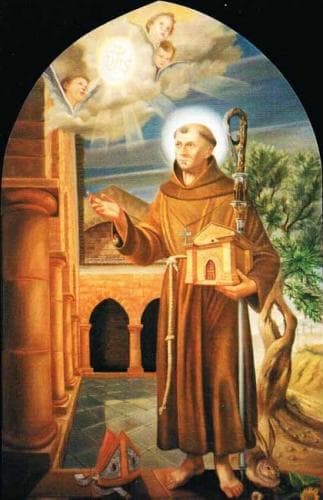
Blessed Matthew Of Agrigento
Blessed
Feast Day: January 7
Death: January 7, 1450
Biography
Blessed Matthew of Agrigento, also known as Matthew GuimerÖ or Matteo Cimarra, was a Franciscan friar and a prominent figure in the Catholic Church during the 15th century. Born in 1377 on the Via Arco di San Francesco di Paola in Rabbato, Agrigento, Italy, Matthew dedicated his life to the service of God and the Church.
In 1391, at the age of 14, Matthew joined the Order of Friars Minor (Franciscans) at the convent of Saint Francis of Assisi in Agrigento. Three years later, he made his profession as a member of the order. Seeking to deepen his understanding of theology, he pursued his studies in Bologna, Italy, and Barcelona, Spain. In 1400, after successfully completing his education, he was ordained a priest.
Matthew spent the early years of his priesthood as a traveling preacher in the region of Tarragona, Spain, from 1400 to 1405. His ability to communicate effectively and touch the hearts of his audience earned him a reputation for being an inspiring and dedicated preacher. In 1405, he was appointed as the Master of Novices at the Saint Anthony convent in Padua, Italy. He served in this role for eleven years, guiding and mentoring young Franciscans in their spiritual journey.
It was in 1417 that Matthew's path crossed with Saint Bernardine of Siena, a renowned preacher and reformer. The two shared a common vision of revitalizing the Catholic Church and promoting a deeper devotion to Jesus Christ. Inspired by their meeting, Matthew collaborated with Saint Bernardine and founded several monastic communities in both Italy and Spain to foster a greater commitment to the Franciscan ideals.
From 1425 to 1430, Matthew served as the Franciscan provincial vicar, overseeing the affairs of the order in a specific region. His leadership skills were recognized, and in 1432, he was appointed as the Commissioner General of Sicily, a position in which he carried out his duties with great diligence and dedication.
On September 17, 1442, Pope Eugene IV, impressed by Matthew's reputation as a reformer and his commitment to the welfare of the Church, appointed him as the Bishop of Agrigento. Taking up this new responsibility, Matthew brought about significant changes in the diocese. He addressed existing abuses, restored clerical discipline, and put an end to simony, a malpractice involving the buying and selling of ecclesiastical offices.
However, Matthew's efforts to reform the diocese and distribute a large portion of the Church's wealth to the poor faced opposition. Some individuals within the clergy, displeased with the changes, accused Matthew of squandering the Church's resources. Even more troubling, Vatican officials initiated an investigation that included accusations of an affair with a local woman.
Despite being found innocent of all charges, these trials took a toll on Matthew's spirit and led him to reflect on his role within the Church. In 1445, he made the difficult decision to resign from his position and return to his true calling as a preacher and supporter of monastic houses. Matthew dedicated himself to spreading devotion to the Holy Name of Jesus, which had always held a special place in his heart.
Blessed Matthew continued his ministry, tirelessly preaching and working to uplift the faithful until his peaceful passing on January 7, 1450. He died in the Franciscan monastery of Santa Maria di Ges√π in Palermo, Sicily, and was buried there. His grave became a source of reported miracles, attesting to the sanctity and intercessory power associated with his life.
Recognizing his holiness and the impact he had on the people he served, Pope Clement XIII beatified Blessed Matthew of Agrigento on February 21, 1767. The Church, elevated by his example of piety and dedication, remembers and venerates him on his feast days, which are celebrated on January 7 and February 8. His life is a testament to the transformative power of faith, charitable works, and the pursuit of holiness within the Catholic Church.